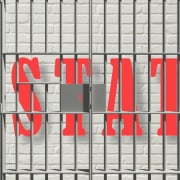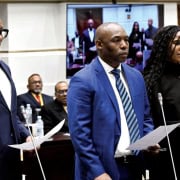|
Getting your Trinity Audio player ready...
|
Image: Flickr/GovernmentZA
Zizi Kodwa is out of a job, out of the ANC’s National Executive Committee, and facing charges of corruption and money laundering. He also faces disciplinary action within the party, according to spokesperson Mahlengi Bhengu-Motsiri, and has had to step aside in line with its policy for criminally charged members. Kodwa was the minister of sports, arts and culture, but resigned on 5 June, just hours after appearing in the Specialised Commercial Crimes Court sitting in the Palm Ridge Magistrates Court. The minister in the Presidency for Planning, Monitoring and Evaluation, Maropene Ramokgopa, has been appointed in the portfolio for the time being.
Kodwa’s appearance signified the start of a trial borne out of an investigation into his relationship with IT company EOH, as recommended by Chief Justice Raymond Zondo in the final report of the state capture commission he chaired.
He is one of about 90 senior ANC members, some of them serving in the executive or in Parliament, who were implicated in the commission’s series of final reports that came out in 2022 following a four-year period of hearings. His co-accused, Jehan Mackay, also held an executive position of influence within EOH. The pair were granted bail of R30 000 each and are expected back in court on 23 July.
EOH and PEPs
EOH’s current CEO, Stephen van Coller, testified before the commission in 2020 that Mackay and several other senior members of the company’s staff had had inappropriate relationships with “politically exposed persons” (PEPs) in the ruling party that appeared to be linked to either side’s proximity to decision-making around lucrative tenders.
In the case of Kodwa, a forensic investigation by ENS Attorneys revealed that he had received cash payments to the value of R1.6-million between 2015 and 2016, in exchange for about 400-million rands’ worth of government contracts awarded to EOH and under the watch of Mackay. At the time Kodwa held the position of ANC spokesperson. He would later provide an affidavit to the commission in which he said the monies Mackay paid to him were in fact loans from a friend, and not related in any way to his position or influence. Mackay, he said, was simply helping him out through a difficult time financially.
The commission heard how in one instance, Kodwa received an amount of R1-million in 2015, which he admitted to using shortly afterwards for purchasing a Jeep in June of that year. The amount is recorded in EOH subsidiary Tactical Software Solutions’s records as “NG KODWA (ANC DONA- JM).” There were also similar records of payments made towards luxury accommodation allegedly enjoyed by Kodwa.
On this, Zondo wrote in his report: “On his own version, Mr Kodwa has never been in a position to repay Mackay the amounts of the loans … and has not repaid any of these amounts. However, he insists they were not payments made as a quid pro quo for any assistance on his part. In particular, he denies that the payments and the luxury accommodation were in any way related to the procurement of government contracts by EOH or related companies.
“Whatever the subjective intentions of Mr Kodwa, it is clear that Mr Jehan Mackay was attempting to buy influence by making the loans that he made to Mr Kodwa and by providing Mr Kodwa with luxury accommodation.”
Red flags
Van Coller testified that he only started noticing red flags months after joining EOH in September 2018. One of these came in the form of a notification from technology company Microsoft that it would terminate its partnership with EOH on the basis of alleged irregularities. That is when ENS was brought on board to investigate.
ENS found, he said, serious governance and control failures across EOH’s 272 companies, collusion with original equipment manufacturers or software owners, and inappropriate gifting and offers of sponsorships and donations, among others. In some cases, payments were made to EOH before contracts were secured with government entities.
The investigation also discovered the inclusion of sub-contractors in instances where the tender did not record such an arrangement. Some of the entities recorded as sub-contractors in projects were known neither to EOH staff nor to the government departments that issued the tender. In some cases the sub-contractors were made up of EOH employees, who took advantage of the 30% empowerment policy to claim that they had sub-contracted work.
Task team progress
National Head of the Directorate for Priority Crime Investigation (the Hawks) Godfrey Lebeya was said in a statement to have welcomed the arrest, commending the work of the state capture task team comprising Hawks investigators and National Prosecuting Authority (NPA) officials.
According to the statement, as many as 21 arrests have been recorded by the task team, with charges brought against eight corporations believed to have played a role in state capture.
Although the NPA could not be brought to comment on any other imminent cases involving high profile individuals accused of state capture crimes, spokesperson Phindi Mjonondwane, said resources to deal with such crimes were set aside.
“This case is just but one of those that build on the number of enrolments that we have done in cases related to state capture. So much of the work continues. We, as the prosecution, will continue to play the role of guiding and monitoring the investigations.”





